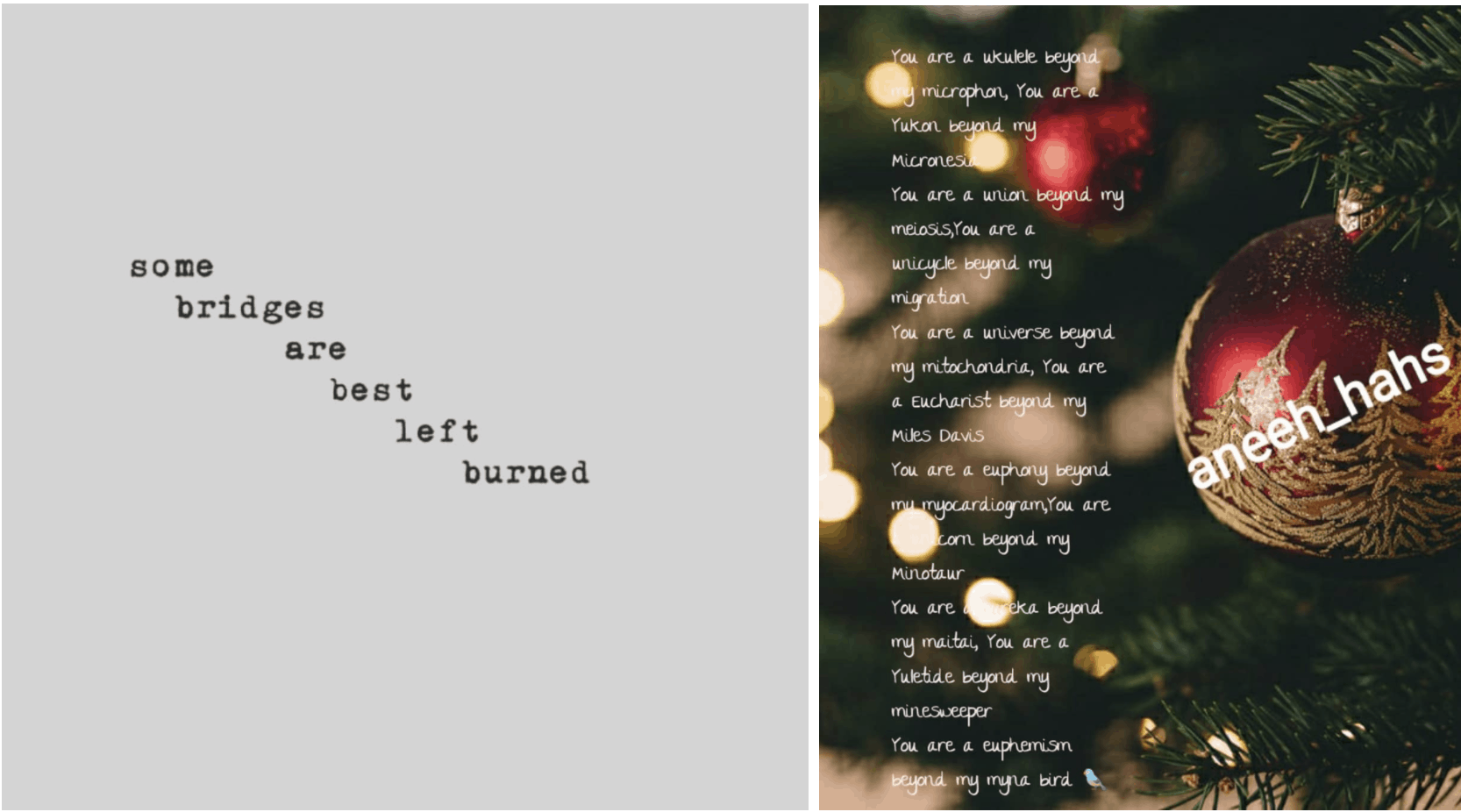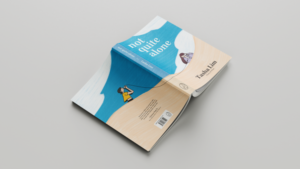Over the past four years of being in the publishing and writing industry, I’ve gotten quite a number of frequently asked questions posed by aspiring, budding writers as well as the press. Here are some of the more popular ones. 😊I’ve had Zack Shah answer these questions on a blog post as well on Penwings Blogs. You can check that out here.
Alright, here we go!
Image source : Unsplash
1. How do you get confidence to show your work to others when you’re scared of harsh critics?
- Research. I spent two years prior to publishing, just reading and reading, and reading. I read books from a wide range of genres and learned from each of them. You can check out my reading journey in this blog post here. I would have never gotten the confidence I had if I had not spent two years just researching.
- I’m my own harshest critic. Other critics out there, have nothing on me. I always read my poems from the point of view of a person who has not read my work before. Call it split personalities, or just plainly putting yourself in someone else’s shoes, but I’m always super tough on my quality.
- Publish to a small audience first. That’s probably how you are going to start out anyway. Minimize the risk!
- Identify which feedback is constructive and which are just plain mean. Don’t just brush off mean comments, read them, and understand where they are coming from too. They are writing it out of a passion for you. You might just get a tip or two that will help you with your writing! Receiving mean comments the first time hurts, I’m not going to lie. But over time, it dulls and you would know how to protect yourself. To be honest, most of my comments have been 99.98% positive. The 0.02% I stumble upon by accident usually.
Example of Constructive feedback:
“Your poems would be better if you had better syllabic verses.”
Of course, I didn’t know what Syllabic Verses were at the time, and I learned from my writer friends about what that meant. This feedback from the earlier days when I started writing.
Example of Mean Feedback:
“Malaysian? So what. Her work is so basic just like Rupi Kaur. She’s not worthy for her success.”
This is a comment I stumbled upon after reaching Best-Sellers. I took this as a compliment because I consider Rupi Kaur an excellent spoken word poet with amazing stage presence. Unfortunately, I get my meanest comments from the writing community. You don’t have to worry about mean comments until you’ve finally made a mark for yourself in the industry. It’s highly unlikely that you would get someone to be really mean to you because honestly if you weren’t any good at all, people just wouldn’t care. It’s your job to make them care. Crave for constructive feedback.
Image source : Unsplash
2. How can I improve to become a better writer and storyteller?
I’ve seen writers in the Facebook writers community groups scolding other writers for asking this question. *Sigh* Why can’t our community be more supportive? It’s a legitimate question!
Anyway here’s your homework for the rest of your lives if you want to pursue writing,
It goes back to question number one. Read an obscene amount of books. Not just best-selling books, even the horrible ones. Grab a highlighter or a pen and highlight (or if you don’t like soiling your books, get a notebook and note these down while you’re reading) :-
What the authors did well:
- Phrases and metaphors that are unusual but beautiful.
- What type of level of vocabulary did they use? Was it similar to a person in high school, or that of an astrophysicist? Did you understand what they were saying?
- Words that describe a character’s profile well.
- Words that describe a scene and environment beautifully for you.
- Common words used to describe an action/fight scene. (He buckled over, air knocked out of his lungs, he swung a fist at his opponent but missed it by a hair)
- How the author builds a character from beginning to end.
- How the author ends a chapter with a cliffhanger on the main character and switches to another story timeline to a side character.
- How different characters in the same story can provide different perspectives just by changing the point of views (POVs)
- What makes Dystopian/Fantasy novels interesting? What are their common themes? Is there Romance, Politics, Family, or Friendship involved? Which themes did the author choose to focus on?
- What is their story arc like? Were you curious from Page 0 to 50, anxious from page 50 to 100, hopeful from page 100 to 200? How did it make you feel?
- What are the different dynamics and relationships the main character has towards the other characters?
- Was there any vulgarity? If there were, did it help with the story progression or character building?
- What makes a good enemy in the book? How did the author manage to instill the level of hate in me similar to what the character is feeling toward the enemy?
- How did the author reverse that and make me feel sympathy toward the enemy?
- Identify backstories.
- Identify which information is hidden then revealed later in the story, and hypothesize why did the author do so.
How they did it badly:
- Why did the ending feel so abrupt?
- Why do I hate all the characters in the book?
- Why can’t I understand anything the author is saying?
- Why did I feel like I’ve wasted my time reading this book?
These are just some questions from the top of my mind. You may add more criteria later on when you get better at it.
Image source : Unsplash
3. How do you come up with new stories and ideas?
First, Read. It goes back to question number one again. I can’t stress enough the importance of reading. What reading does for you here:
- You could understand what the readers are interested in these days. You get updated on the world’s perspectives and ideologies of life. Let’s say if you don’t read, and you are stuck in your little world, you might accidentally write a book with offensive ideologies accepted in 2000, but not in 2020.
- You are able to identify gaps in the saturated market. Reading a wide range of books, or at least just knowing what the popular stories out there in the world are, you are able to identify what makes a novel popular and what slight deviations the author has made to make their novel big. All stories are similar in a way, but different too. Readers find comfort in having a balanced sense of predictability and uncertainty while reading a story. To be honest, not all stories are new. They’re just the same, but slightly different.
Second, keep notes. If you find something interesting happening in your life, notice a problem that hasn’t been solved yet, or inspired by an insightful conversation you’ve had, write it down. Get a tissue and scribble your thoughts down or simply just note it down on your mobile. When you do have time to write and brainstorm, you won’t need to start from scratch.
Third, write about something you are an expert in. Don’t be afraid if you have an unusual career that will not be relevant to anyone. The cool thing about this, is you could provide never before seen insights into the life of a person no one has access to. For example, this book I’ve recently read, Being Mortal by Atul Gawande. He is an expert in geriatrics. Who knew someone could tell such a moving story about people in elderly care? Embrace your unique insights. It becomes very real.
Image source : Unsplash
4. How do you write the first chapter? How do you start and stay focused?
I’ll answer the first question first. Before I start my story, I create a draft outline. The importance of creating a timeline is so that you won’t get lost while you’re writing. I had some friends who started writing their novels but never seemed to finish them because the events would just get so long, and eventually, they get stuck. They didn’t know how to progress from then on because they had dug themselves into a storyline that’s hard to pivot. So much work has gone into it and they didn’t want to rewrite the thousands of words they have written. Then, they give up.
A draft outline should look something like you’ve done in high school. An intro, middle, and an end. There are more detailed outlines (government form structures) online but I feel like they’re sole purpose is to suck the inspiration and fun out of you. This is a really cool template by Victoria Naughton’s strategy, ‘Picture It!’. I’ve made some adjustments to the original template. Download and print a few pieces and have a go!
Here’s a sample I did for Harry Potter’s overall storyline. Notice how I left out the other problems Harry had to face like Draco Malfoy and his annoying family at Surrey? It’s good to get a good grip on the main story first even if you don’t have the names of the characters at hand. Then once you have done the overall story, use the template again and add on the side stories to make yours more interesting.
If you need more guidance, you could check out the Hero’s Journey. Lord of the Rings, Harry Potter, Hunger Games, and all the other popular Hollywood movies and books are based on this main model anyway. They’ve just added unique complexities that makes their story engaging and one-of-a-kind.
Image source : Wikipedia
5. Why do you write?
Oh, a personal question. I write for both community and personal reasons. I want Malaysia to be known for more than just Forest Reserves, Durians, and Orang Utans. I want Malaysians to have the confidence to contribute relevant work and have their work demonstrate the ability to challenge current perspectives and ideologies. I strive for a more tolerant society and a more tolerant world. Reading good work has opened my mind and changed my life forever and I want to do the same for others.
For personal reasons, I will answer it with this comic strip by KALBO. 😊
Image source : Unsplash
6. Is it better to write based on personal stories or based on someone else?
If you’re a beginner empath and researcher, start with your personal stories first. Once you have a good grip on placing yourself in others’ shoes, try challenging yourself to write with a different voice every week. Be a doctor this week and a sanitation engineer the next. Writing based on someone else’s experience takes a lot of work and research because you definitely want to do justice to their career or personal goals. It’s a higher risk. To make sure it’s 100% believable, have a chat with them and take notes on how they approach and overcome challenges, how they think and how they react to their environment and people around them. You’re basically creating a very detailed profile on their lives. I do all of this now, but just by closing my eyes and pretending to be them.
When I write, I write from many perspectives and I collect feedback and build their profiles in my mind.
Here’s a piece I wrote called Love me, if you can. I wrote it from a person who has dementia. I pray that I don’t develop the disease. I’ve watched countless movies and read about the common behaviors of people who suffer from mild to serious dementia. The most heartbreaking part of the disease is when they could be 100% them then lose their entire identity the next moment.
Image Source from @cotypoems Instagram
This is another piece I wrote from another person’s perspective. Playboy. He was my friend and I asked him a lot of questions on why he chose to adopt the player’s lifestyle. I always aim to humanize stigmatized labels and give different perspectives to my readers. I want to teach people to judge slowly and empathize quickly.
Image Source from @cotypoems Instagram

7. What do I do after I’m finished with my manuscript?
This is the hard part. Getting your work approved by publishers. Get out those Googling fingers and start searching for Publishing houses near you! You can submit your manuscript to my company of course at hello@penwings.com and we will review it and get back to you with feedback. Here are some important tips if you’d like to submit your manuscript and increase the possibility of success.
- Most importantly, make sure there are no grammar or spelling mistakes unless it’s intentional like Flowers for Algernon by Daniel Keyes. I’m going through these manuscripts pretty quickly and so will your future readers. We can only handle a specific amount of entropy. Pay an editor, or get someone with English as their first language to proofread your work before sending it in.
- Do not send in suicide, depression notes masked as poetry. As much as melancholy is a huge market in poetry, the work I choose to publish by my company has to impact readers in a positive way and bring solace to them. Not make them want to die. Please, see a counselor or continue writing in private if it helps you heal. There are certain types of responsibilities we have to take into account when putting work out in public with readers with different comprehension levels.
- Do not just send one page of poetry and ask to be published. Most publishers want a full book of about 200 pages at least.
- When sending in a novel, please send in a physical copy as well so it’s easier for the publishers to read and take notes. It’s also common courtesy. It will also take a longer time to review so please be patient.
- Send follow up emails after a week or two to check on progress. This is a good practice as publishers get swarmed with manuscripts daily and might have missed out on yours.
- Here’s a form I’ve made for this blog post. You may use it to submit your manuscripts to other publishers as well.
8. What are the platforms to publish your work online to get feedback? Any social media marketing tips?
Good for short snippets, poetry, and short stories. You can private your account first, making your work only visible to a few. But I’d strongly recommend that you make it public and use hashtags like #poetrycommunity #poems #poetry #writingcommunity and interact with other writers on the platform as well. Comment, like, and follow authors you can draw inspiration from on the channel and observe how they market their work. IF you analyzed closely, #instapoets are always keeping a high ratio of posts:followers:following. It’s like a 10:1000:1 ratio. They would try to keep their number of posts as low as possible by archiving their older posts and reposting them every day to grant the illusion of limited supply to high demand. Just try to pick out a few #instapoets and observe their patterns and behaviors on this platform.
Collaborate with other Instagrams and do poetry rengas. Bridge between other art communities like the calligraphy community! They’re always looking for beautiful words to make into art.
They also post very short snippets that anybody, and I mean ANYBODY can understand and feel. Their templates are neat and clear, readers only need a whole 0.5 seconds to read and decide if they like the piece or not. Sadly, longer pieces are a bit more difficult to share. Have a look at these two posts on Instagram. Which one do you think has more engagement?

Image Source @zackshahpoet and @aneeh_hahs on Instagram
Depending on your confidence levels, you may post your work on Facebook Writer’s Communities or your personal Facebook wall to gather feedback. Here are some of the groups that could help you out. Most of these groups frown upon self-promotion, so keep in mind when you’re posting! You don’t want to get banned. Questions like, ‘Know any good names for an antagonist set in a futuristic world?’ are fine. Don’t be disheartened when no one replies to your posts, just post another one. I’ve posted the links to the groups as well.
Malaysian’s Writers Community / Komuniti Penulis Malaysia
Hahahhaha. This is the group where I had that one guy who write that mean comment about me in point 1 because a fellow writer (love you) posted a media article praising me and my work.
I’ve personally never used the platform before, but I reported a person uploading my work there without my consent and claiming to be me. HOWEVER, I’ve heard great things about this platform from my fellow writer friends and the exposure on Wattpad is crazy. Have a go! You can even sell your work directly on this platform as well.
Another easy platform to link all your social accounts. Let’s hope your work starts a chain of reblogs! Lang Leav started her journey on this platform and was scouted by Andrews Mcmeel Publishing.
Link your Instagram to twitter! It’s great for short haikus. Increase your digital footprint by being on all social media channels. Even Pinterest! It might get quite overwhelming at times, but it’s the hard work that you need to put in to really get people to pay attention to your work.
Events and Readings
Image Source: Pexels
Don’t just limit your sharings online, take it to the streets! The best kind of feedback is instant feedback. Observe your audience’s sighs, laughter and cries during your reading. You’ll know which parts of your story to elaborate or rewrite.
Image Source: Unsplash
9. Do you write in past tense or present tense? What’s the difference?
Reasons to write in the past tense:
- If you are describing a situation that has happened before.
- If a character is referring to an event in the past to other characters.
- If there’s a bigger entity, a god-view storyteller telling the story as a whole.
Reasons to write in the present tense:
- You want to connect and give a sense of real-time to the readers. Everything is happening right now.
- To give a sense of urgency and unpredictability of the future.
- I think this is the main reason why I prefer to write in the present tense. If a character is reminiscing the past and their mind and body are brought back to the past, making them present in the past. It makes time traveling easier for the reader. Okay, let me write you an example of switching from past to present:
Harry thought about the event when he was on his first date with Jess. (past)
“Hey Jessica, so…do you like me?” he asks while looking down, fidgeting nervously with the strings of his hoodie.
“Harry…” she replies with a soft sigh…(present)
“Harry.” his sister nudges him out of his daydream. (back to the real present)
“What?”
“Nothing, you just look really, out of it.”
You might want to time travel carefully without confusing your reader.
Image Source: Unsplash
10. Which Point Of View (POV) should I use?
Reasons for using first person point of view:
- The emotional link between the main character and your reader is stronger.
- The reader would feel like they are playing a game. It gives an illusion of control.
- It’s really up to you, there are no hard rules between choosing between the two.
Reasons for using the third-person point of view:
- You want to give a storytelling vibe, a certain god-view feel for your reader.
- The reader would feel like they are watching a movie.
- It’s really up to you, there are no hard rules between choosing between the two.
Image Source: Unsplash
11. What do you think when creating a book cover?
- Marketability. People judge books by their covers. Especially if you are an unknown author, first impressions are the most important. Survey and research online. Understand your readers and how they recommend books to people. Word of Mouth is an extremely powerful marketing method. What makes them want to post your book on their social media? Do they just want to recommend the book to others? Or are there any other uses for your book as well? Can it be a very beautiful prop for their day-to-day pictures on social media?
- Future prospects. Is this book going to be a part of a series? If it is, which parts of the cover can I modify and variate without changing the overall feel?
- Branding. Almost every mainstream author out there has a specific look and brand to their book covers. This is important because readers can easily identify your work out of the thousands of books in the market. You want to create that consistent look that readers can remember.
- Practical Beauty. Who wants an ugly cover? Can this book be given as a gift? You wouldn’t want to have controversial icons and logos plastered all over your cover. It reduces the size of your market and buyers. The size of the book matters too. If your books are all in a different size, it would be very difficult for the in-store workers to store and shelve your books.
In conclusion,
it’s okay to feel lost. It’s normal to not know where to start, or how to do it. And once you’ve started to read all these tips online, you might feel like you’re drowning a little. But don’t worry, like most learnings, these things take time and a lot of trial and error. Dare to fail… intelligently! Here’s what I learned about courage from a book Being Mortal by Atul Gawande:
Courage is the strength in the face of knowledge of what is to be feared and hoped. It’s not standing up to what you don’t know in reckless faith, or standing up in courage because of what you know in intellectual pride. It’s both.
Everyone is on their own tangent; do not compare your journey with others. Focus on your craft. Focusing on your weaknesses is definitely harder than focusing your attention on the strength of others, but it’s certainly the best way to move forward. Good luck.



